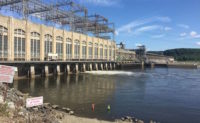At a time when the complexities of securing safe, reliable water supplies have increased in step with the demands of growing communities, ENR Southeast’s 2019 Legacy Award recipient, Robert G. Maliva, stands as a go-to source for insights and ideas.
A principal hydrogeologist with WSP in Fort Myers, Fla., Maliva has devoted much of his 30-year career to international research and consulting for groundwater resources management, subsurface geology and fluid flow investigations. His work includes analysis, design and permitting of aquifer storage and recovery (ASR) and managed aquifer recharge systems; injection well design; production wellfield design; and water resources evaluations.
While the majority of his career has focused on Florida, Maliva’s knowledge has been called upon on projects in such far-flung locales as the Middle East and Australia.
In addition, Maliva has written four books related to the subjects of aquifer storage and recovery as well as dozens of peer-reviewed publications and book chapters.
In nominating Maliva for the Legacy Award, J. Steven Paquette, WSP USA’s president for water and environment, characterized Maliva as “a true pioneer” in the field who helped a range of clients “tackle evolving challenges related to water risk using innovative techniques and advanced technology.”
“He has taken the science of groundwater resources to a new level,” Paquette adds. “He is always trying to find something to advance the state of the practice. He is an amazing individual, yet humble and a pleasure to work with.”
“Bob is good at thinking outside of the box and setting a framework for finding avenues that are different from conventional approaches.”
– Monica Autrey, Operations Manager, City of Destin, Fla., Water Utility
A self-described rock collector for as long as he can remember, Maliva earned a PhD in earth sciences from Harvard University and went on to hold research positions at Harvard, the University of Cambridge and the University of Miami’s Rosenstiel School of Marine and Atmospheric Sciences.
For someone who would go on to become a prolific researcher and technical author, Maliva thought that a career in academia would prove less than appealing.
“I really felt it’d be more interesting to become a consultant,” he says.
The door to that career path opened in the early 1990s, when Maliva met fellow hydrologist Thomas M. Missimer, who would go on to launch a series of consulting firms assisting Florida communities with groundwater remediation projects. Maliva, he says, was usually his first hire.
“You always want the smartest person in the room to be the foundation for a company,” says Missimer, who now heads the Emergent Technologies Institute at Florida Gulf Coast University. “Bob’s been that person at every stop.”
The need for such expertise has become increasingly important over the years. Maliva recalls that while fresh water seemed readily available in the early part of his career, “all the low-hanging fruit has been picked” when it comes to easily extractable sources. “Now it’s more difficult, more challenging and more expensive.”
Although approaches such as ASR systems and desalinating once-undesirable brackish groundwater have emerged as promising alternatives, there are also new technical, regulatory and public issues to deal with.
“Not everyone wants an injection well in their backyard,” Maliva says.
Fortunately, Maliva’s skills as an innovator and communicator complement his vast technical knowledge. Monica Autrey, operations manager for Destin, Fla.’s water utility, credits him for helping clear the way for the Panhandle’s first ASR system, providing the barrier island with a valuable resource for use during dry or peak irrigation periods.
The nearly decade-long project, completed by WSP in 2017, stores reclaimed water in a shallow sand-and-gravel aquifer in an environmentally sensitive area. By limiting the stored water to non-potable uses, the system frees Destin from the expense of meeting state treatment and disinfection requirements.
“Bob is good at thinking outside of the box and setting a framework to find avenues that are different from conventional approaches,” Autrey says. “He brings a lot of detail to projects and provides analyses to make sure we’ve covered everything, including interpreting regulatory ambiguities to ensure outcomes meet everyone’s needs.”
Missimer adds that even engineers don’t always understand a project’s geologic or hydrologic perspective.
“Bob’s a good blend between those two worlds, which is a big benefit to decision makers,” he says.
Despite his extensive knowledge, Maliva considers himself a perpetual student. In his acceptance address at ENR Southeast’s Best Projects award ceremony in November, Maliva noted that, “I am still learning new things through reading technical papers and technical reports on other projects and acquiring new technical skills. The act of researching and writing technical papers and books has been a great impetus to keep abreast of what is going on in my field.”
Maliva continues to make his own contributions as well. He’s currently at work on a new book that examines climate change and groundwater adaptation strategies, drawing on best practices from around the world. Along with tackling new projects at WSP, he’s collaborating with Missimer on research proposals for studies that hopefully will yield improved desalination techniques for both brackish water and seawater, producing better quality water for treatment plants.
“From a technical perspective, this is an exciting time to be in the field of hydrology,” Maliva says. “Projects and issues that are already highly complex will only become more challenging in the years to come. It will take more technical skills to solve these problems, and it’s important that younger professionals in the consulting and engineering fields take the initiative toward developing them.”






Post a comment to this article
Report Abusive Comment